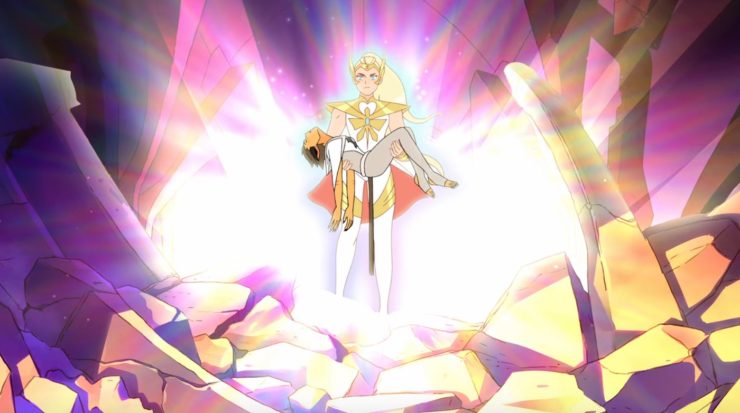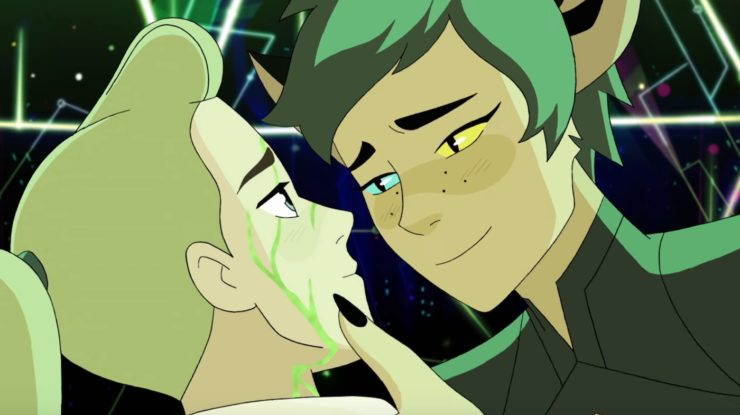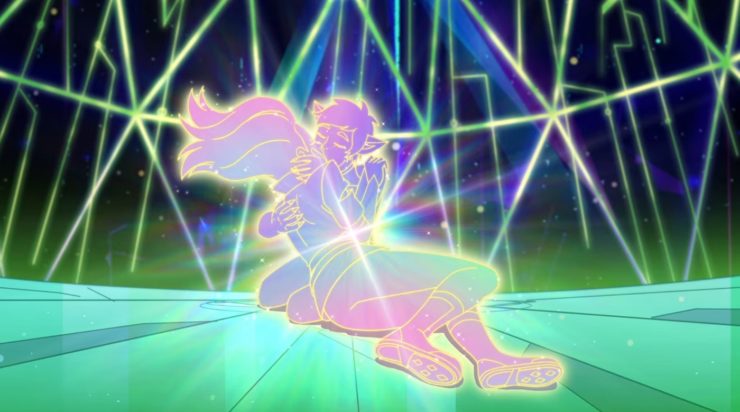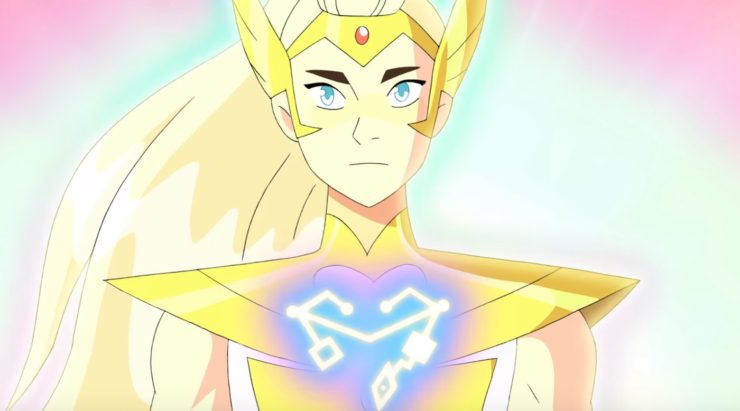If you watched the first season of She-Ra and the Princesses of Power, and reached the episode “Princess Prom”, you may have felt that the show was making a promise—a fictional universe in which seemingly everyone was queer and characters were free to romance, befriend, and stand by the people they chose without concern for what our world might think of it. You may also have wondered if the show would be permitted to fulfill that promise.
Oh, my friends. The team behind this show wasn’t about to step away before giving us what we deserved.
[Spoilers for the final season of She-Ra.]
The thing about the final season of She-Ra is, Noelle Stevenson and her team don’t wait until the last episodes to give us the goods. Season four left us with too many pressing questions, too many problems that need sorting. Entrapta and Scorpia need more time to adjust to their places in the Rebellion, Glimmer needs rescuing, King Micah needs to see his daughter, Adora needs to find out if there’s any way to be She-Ra now that she has destroyed the Sword of Protection, Catra needs to figure out whose side she really wants to be on, Hordak needs to break from Horde Prime’s clutches, Horde Prime needs to prove he’s a villain to be reckoned with. You can’t wait to get all of these things done, or the end will just be a great big mess. So the fifth season hits the ground running with the biggest turnaround of all—Catra decides to save Glimmer and give herself up to the Horde.
But Adora can’t leave her oldest friend to die at the hands of Horde Prime, so she mounts a rescue anyhow. And in that rescue, she finds that she can still access the power of She-Ra. Because there’s too much going on around her, Adora fails to realize what triggers the transformation—love brings She-Ra forth. In many ways this has always been true, but the fifth season makes that love more personal to Adora herself. It is her love for the people closest to her that brings back She-Ra’s strength.
Now, this may seem like an obvious move when the arguably most famous female superhero in the world, Wonder Woman, also fights for others out of love. But She-Ra’s execution of this theme makes it more deft and meaningful than any other super being out there because love isn’t actually tied to Wonder Woman’s powers—it’s simply who Diana is as a person. For Adora, the ability to fight as She-Ra is predicated on her love of others. She cannot access those powers without love. She cannot be She-Ra without love.
Ergo, She-Ra is love.
In accessing that love, Adora can be She-Ra, and She-Ra’s return heralds a return to form in the truest of styles. The princess prom episode was all about taking teen movies and rights of passage, and queering them for people who never got to have that experience in the same manner as their straight peers. Episode five of this season, “Save the Cat”, is about taking full-blown romance novel tropes and queering them to ultimate dramatic effect. Adora saves Catra from the Horde, and when she emerges as She-Ra, carrying an unconscious Catra in her giant muscled arms… there are no words for how it feels to watch that. “Swoon” doesn’t begin to cut it.

There are a lot of interpersonal dynamics to sort before the Horde can be defeated, and some come out in the wash easier than others. The Princess Alliance has it out with Entrapta early on, believing that her inability to listen is an indication that she doesn’t care about them. Perfuma tries to prove over and over to her friends that her belief in the power of friendship and love to overcome is a strength, not a naive weakness. Bow is still angry with Glimmer for refusing to listen to him and Adora about the Heart of Etheria in the previous season. Scorpia is struggling with confidence after getting away from Catra and finding a place among the Rebellion. Micah is terrified that he won’t know how to interact with his daughter after missing the majority of her childhood. The show is at its best when it really zeroes in on these relationships, and gives its characters time to think and heal.
This season speeds by far too quickly, and as a result, it’s easy to miss certain characters. Double Trouble doesn’t get enough screen time (but when they appear they’re always fabulous), and it would have been nice to see even more Scorpia or Hordak (though Wrong Hordak is an utterly delightful addition to the crew). But everything that needs focus gets its due, the show’s signature sense of humor remains intact for the whole ride, and the narrative themes utterly shine by the end.
Importantly, the effect of Shadow Weaver’s abusive mentoring is finally brought forward, as she continues to try and manipulate Adora and Catra once they make it back to Etheria. Her efforts almost allow her to take hold of them all over again, but the two of them are older, less inclined to trust their mentor and mother-figure at her word. When she manages to ensnare one, the other is always right there to point out her lies and obfuscations. Repeatedly, Shadow Weaver tries to convince Adora to let go of Catra in order to do her duty for Etheria, insisting that Adora’s emotions are not compatible with what is needed of her. While it is clear that she believes she is doing right by her protege, Adora finally tells her off when Shadow Weaver’s actions seemingly cost her Catra’s friendship for good. “You ruin people,” she tells the sorcerer. And for the first time, it seems that Shadow Weaver might realize that everything she did wasn’t for the best.
The show tells us in no uncertain terms that you can only make up for abuse with concrete actions. Shadow Weaver has to show Adora and Catra that she has their best interests at heart. She does this partly by making a key course correction—she finally comes to see that Adora and Catra are stronger together, that they need one another to succeed and to thrive. She gives up her manipulations of them both so that they can aid one another, and in doing that, she proves that she does love them both, and in some small way makes up for the hurt she put them through in childhood.
She-Ra also has a lot to say about the cost of heroism. In a world where we frequently expect our heroes to sacrifice everything for a greater good—especially women, who are already expected to sacrifice for others in their daily lives without question or complaint—She-Ra wants us to know self-sacrifice is a poorly conceived metric. When a holographic echo of Mara (the former She-Ra) meets Adora on her way to the Heart of Etheria, she asks her what she wants. And when Adora tries to demure, Mara tells her outright: “You’re worth more than what you can give to other people. You deserve love, too.” If the show had only one lesson to impart, that one would make up the price of admission all by itself.
But the fact that Mara says it doesn’t mean that Adora believes it. While the final battle is raging on the surface of Etheria, while her friends are in the fight of their lives to rescue their comrades from the Horde’s brainwashing, while the Horde is close to getting the power from the Heart of Etheria and using it to potentially destroy the universe, Adora is close to dying with only one person at her side—Catra. The toxic friend who Adora needed to let go of at the start of the series, Catra’s propensity for self-doubt and self-sabotage was always her greatest weakness. After being rescued from Horde Prime’s fleet, she got a taste of all the things she was missing. The friends that Adora made, the sense of camaraderie that the Rebellion engendered, what it felt like to be back at Adora’s side. But she had another confession, too, one that she had never been able to voice… she loves Adora. With her life hanging in the balance, Catra finds the courage to say so. And it turns out that Adora loves her, too.

In case you forgot, She-Ra is love. So she returns with a vengeance, and stops the Horde dead in their tracks.
Adora and Catra’s gay love literally saves the universe, and suffuses their planet in rainbows and magic. Queer love conquers all. I didn’t expect this ending. I didn’t dare hope for it. I should have known better.
After all, it is true.

Emmet Asher-Perrin hasn’t stopped crying since they finished the show. You can bug them on Twitter, and read more of their work here and elsewhere.










